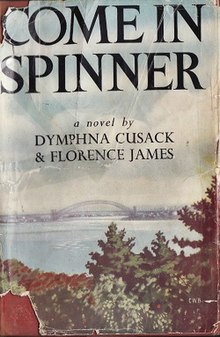This is an old revision of this page, as edited by Alexis Jazz (talk | contribs) at 18:12, 30 April 2021 (Removing empty <nowiki> tags). The present address (URL) is a permanent link to this revision, which may differ significantly from the current revision.
Revision as of 18:12, 30 April 2021 by Alexis Jazz (talk | contribs) (Removing empty <nowiki> tags)(diff) ← Previous revision | Latest revision (diff) | Newer revision → (diff)
 First edition (publ. Heinemann) First edition (publ. Heinemann) | |
| Author | Dymphna Cusack and Florence James |
|---|---|
| Language | English |
| Genre | Fiction |
| Publisher | Heinemann |
| Publication date | 1951 |
| Publication place | Australia |
| Media type | |
| Pages | 416 |
| Preceded by | Pioneers on Parade |
| Followed by | Say No to Death |
Come in Spinner is an Australian novel by Dymphna Cusack and Florence James, originally published in 1951 and set in Sydney at the end of the Second World War.
Name
The title refers to a phrase used in the Australian gambling game of two-up. "Come in spinner" is the call given by the game manager when all bets are placed and the coins are ready to be tossed.
Plot
The book tells the story of three women, Claire, Guinea and Deb, who are co-workers in the beauty salon of an exclusive Sydney hotel. The story weaves together these characters with their familial and romantic relationships, as they struggle to manage the realities of working for the privileged upper classes, to whom no rules apply, while their own families cope with wartime deaths and losses, rationing, government manpower recruitment and stiflingly conservative attitudes surrounding the role and perception of the "acceptable" behaviour of women.
Publication
The original novel was so controversial that it was published in abridged form. The characters' journeys cover such topics as abortion, adultery, prostitution and rape, as well as promiscuity and the black market. The book was restored to its original form by Florence James and republished in 1987, partly due to the interest caused by the development of a television adaptation of the book. Dymphna Cusack was not able to take part in this restoration or witness the renewed popularity of the novel as she died in 1981.
Radio adaptation
In 1954 the novel was adapted as a serial for radio. It was a popular adaptation but controversial and was axed in Melboune after viewer complaints.
Film and television
| Come in Spinner | |
|---|---|
| Based on | Novel by Dymphna Cusack and Florence James |
| Written by | Lissa Benyon Nick Enright |
| Directed by | Robert Marchand |
| Starring | Lisa Harrow Kerry Armstrong Rebecca Gibney |
| Country of origin | Australia |
| Original language | English |
| Original release | |
| Network | Australian Broadcasting Corporation |
| Release | 28 March 1990 (1990-03-28) |
In the 1950s, film director Jack Lee expressed interest in making a movie out of the novel.
In 1989–90, the Australian Broadcasting Corporation made a television mini-series based on the novel, starring Lisa Harrow, Kerry Armstrong, Rebecca Gibney and Martin Vaughan. The series was well received by critics and audiences and was released on DVD in 2005. The soundtrack album was released featuring Grace Knight and Vince Jones. It was produced by Martin Armiger with arrangements and conducting by Derek Williams and William Motzing. The album achieved platinum sales awards.
See also
References
- Austlit – Come in Spinner by Dymphna Cusack and Florence James
- Philp, Peter. Drama in Silent Rooms: A History of Radio Drama in Australia from 1920s to 1970s. Eureka Media Communications. p. 420-421.
- Douglas Brass (31 October 1952). "London Notebook". The Advertiser. Adelaide, South Australia. p. 2. Retrieved 2 December 2017 – via Trove, National Library of Australia.
- Come In Spinner at IMDb
- Ed. Scott Murray, Australia on the Small Screen 1970–1995, Oxford University Press, 1996, p. 183
- Vince Jones & Grace Knight – Come In Spinner. Label: ABC Records – 838 984-1. Discogs
- Derek Williams. Discogs
External links
| Logie Award for Most Outstanding Drama Series | |
|---|---|
| |
| Works by Dymphna Cusack | |
|---|---|
| Novels |
|
This article about a 1950s novel is a stub. You can help Misplaced Pages by expanding it. See guidelines for writing about novels. Further suggestions might be found on the article's talk page. |